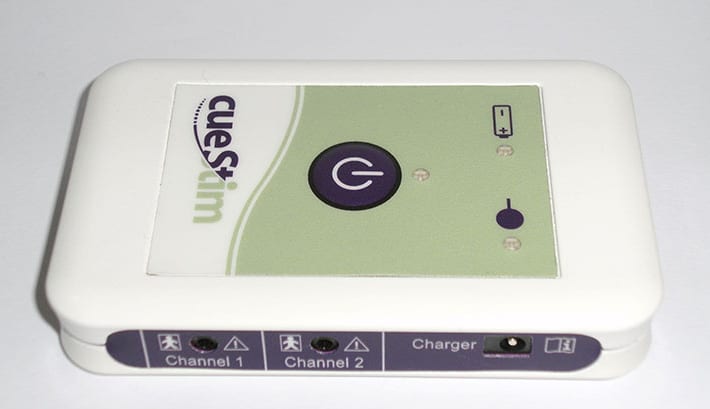New study shows that wearable electronic device could reduce mobility problems in Parkinson’s

Engineers and scientists at NUI Galway have collaborated with clinical professionals from NHS Greater Glasgow and Clyde (NHSGGC) to carry out a clinical study to find out whether cueStim can help relieve freezing of gait.
Freezing of gait is a mobility abnormality associated with Parkinson’s disease, which is described by people with Parkinson’s as a feeling as if their feet are stuck or glued to the floor, preventing them from moving forward.
The research found that ‘fixed’ rhythmic sensory electrical stimulation (sES), designed to prevent freezing of gait, significantly reduced the time taken for a person with Parkinson’s to complete a walking task and the number of freezing of gait episodes which occurred, helping them to walk more effectively.
The study involved a group of people with Parkinson’s testing how effective the sES electronic device was in helping them to manage their mobility issues.
NUI Galway Co-investigator Dr. Leo Quinlan, from Physiology in the School of Medicine at NUI Galway, said: “These results are very encouraging as they show that cueStim reduced Freezing of Gait episodes and the time to complete a walking task in an independent clinical assessment with a pilot home-based study carried out by NHSGGC.”
The clinical study was designed by Dr Anne-Louise Cunnington, Consultant Geriatrician, and Ms Lois Rosenthal, Movement Disorder Specialist and Highly Specialised Physiotherapist, both from NHSGGC, and involved the participants completing home-based, self-managed walking tasks.
Lois commented: “Freezing of gait is one of the most frustrating and difficult symptoms for patients to suffer and specialists to treat. This common feature of Parkinson’s is not improved by Parkinson’s medications, and is inconsistently responsive to cueing techniques trialled by physiotherapists.
“This collaboration between NUI Galway and NHSGGC explored a novel intervention and results were very encouraging. We now need a larger scale study to further evaluate effectiveness and real-life practicality.”
cueStim was developed by Dean Sweeney as part of his PhD studies in the Discipline of Electrical and Electronic Engineering at NUI Galway.
The study was jointly funded by Science Foundation Ireland and the Framework 7 programme of the European Commission and was carried out in collaboration with Stobhill Hospital and Glasgow Royal Infirmary within NHSGGC.

